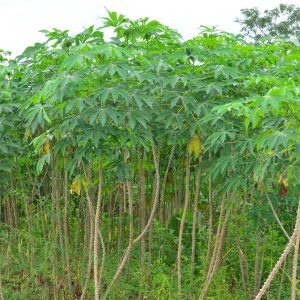Garri, made from grinding and frying cassava, has emerged definitive of the economy of some parts of Benue State in central Nigeria. Not only has the price for the stuff risen so high as to be an autonomous incentivising factor for cassava farmers, it is also transforming key local markets into global spots. At the heart of the observed transformation are Afor, Ekeh and Ojapo markets, all of them in lower part of Idomaland as yams, fruits and grains (soyabeans, guinea corn, and millet) still dominate the agrarian economy in much of Tivland.

Sacks of garri
As at the last Afor market day, Monday September 14th, 2020, a basin of garri went as far as N10, 000 from N2000 previously. This is reckoned with as the best incentive to cassava farmers in recent years. Cassava is easier to farm compared to yam, for example, although yam is the epitome of manliness in the Idoma cultural universe.
Intervention was told that a typical Afor, Ekeh and Ojapo market day witness bulk buyers from as far as Libya, Chad, Cameroon, Cross Rivers State, Aba, Enugu and Portharcourt. These are the rain makers in those market days in the sense that it is in their turning up in as many as hundred lorries that raises the price. The in-coming has been estimated as massive in the current season, traceable, according to local actors, to the aftermath of the lockdown.

 In other words, the rising food cost across Nigeria is, however, producing a different outcome in some parts of the country, that of garri around Idomaland being a case in point.
In other words, the rising food cost across Nigeria is, however, producing a different outcome in some parts of the country, that of garri around Idomaland being a case in point.
There is a sense in which this is nothing totally new as the price of most of the agricultural products fluctuate all the time. What is not clear is the mention of the coming in from as far places as North and Central Africa. One explanation is that this is happening because Maiduguri which used to be the meeting point for garri, palm oil and fish is now a no-go area. Still, there is the unclear issue of why North African buyers when the consumers cannot easily be discerned. While EU preferences for fresh cassava as livestock and poultry inputs explains that of cassava, that of garri is not clear.

Map of Nigeria showing Benue State on the right side

Ojapo, one of the heavy cassava producing areas in Okpokwu LGA
The question now is how long the surge may last since what is not happening has nothing to do with any systematic intervention by either the Federal or Benue State Government. As thus episodic developments, it could fizzle away as suddenly as it started. Yet, Benue State it should be if any state should be shining with innovations in agrarian reform. Unfortunately, that is the state where a Commissioner for Agticulture reportedly told a professor colleague some five years ago what anybody is supposed to do with fruits other than their casual consumption and roadside sale. That is notwithstanding the state calls itself “the Bread Basket” of the entire Nigeria! some empty slogan!
In the absence of any such organised intervention, agriculture remains wholly a matter of manual labour and rain fed dependent, meaning that subsistence farmers are still feeding a bulk of Nigerians. That population is depleting by the day as the few young persons that can be seen in farming are basically those yet unable to find jobs as security guard, construction workers and other menial jobs in the cities and who have not gotten into criminality or cultism.
Agrarian reform in Nigeria is hardly ever beyond land destroying fertiliser application strategy whose potentials are aborted by politicisation, aggravated partisanship and corruption surrounding the distribution of the stuff.




























